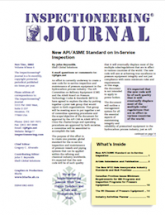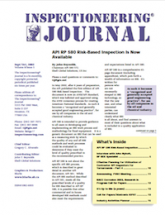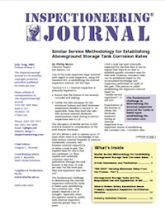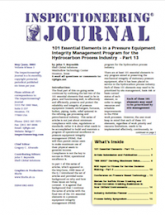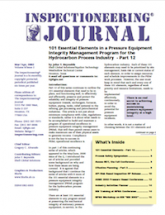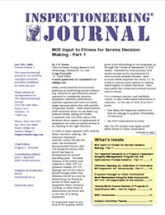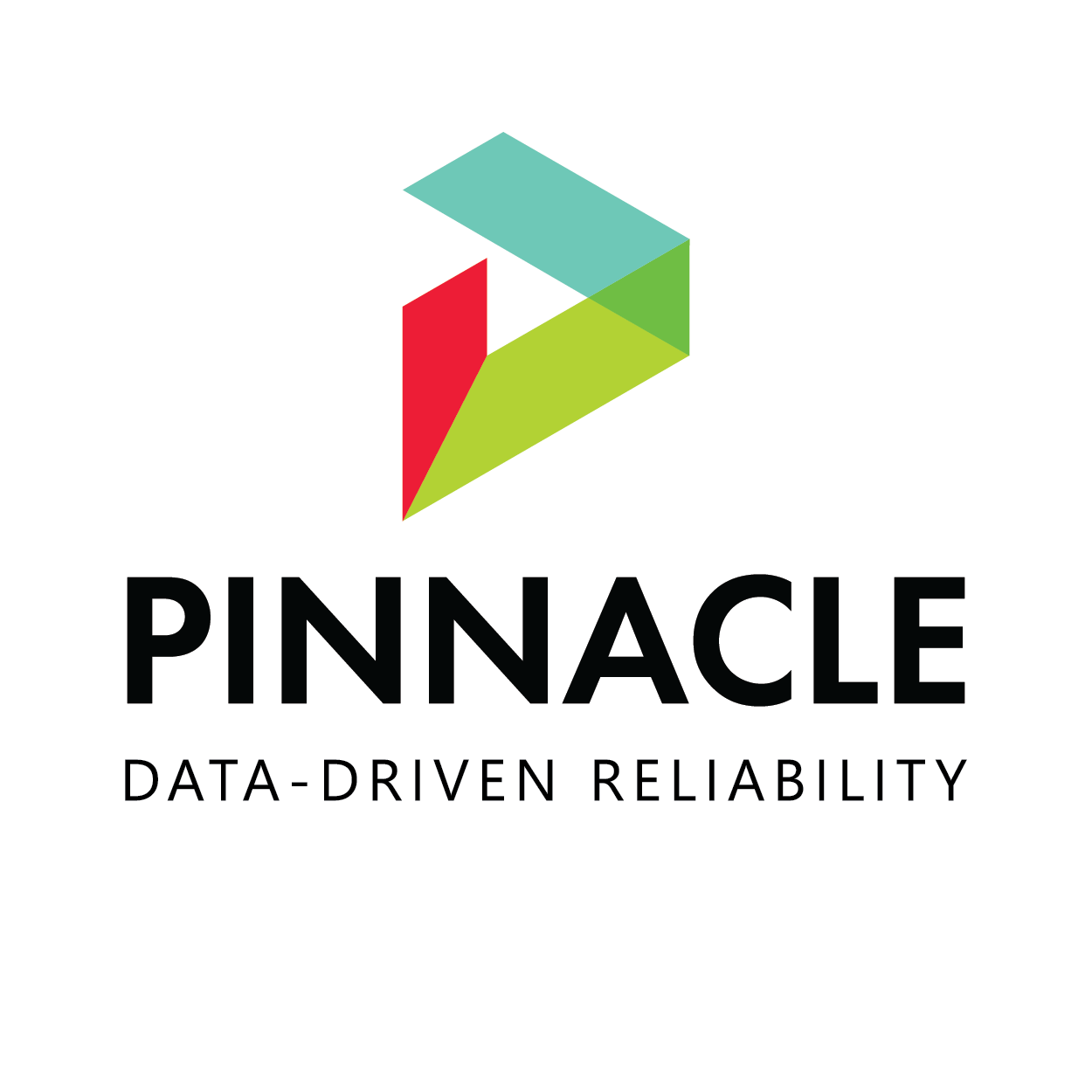Canadian Province Issues Minimum Requirements for RBI
New API/ASME Standard on In-Service Inspection
The New SPCC Rule Incorporates Industry Standards and Best Practices
API RP 580 Risk-Based Inspection Is Now Available
Effective Planning For Utilization of Contractor API Inspectors For Turnarounds
"RBI 2002" Deriving Maximum Value from the Process - An Owner User Perspective
Aboveground Storage Tanks and the Responsible Use and Application of RBI
Alberta Boilers Safety Association (ABSA) Issues Directive
Similar Service Methodology for Establishing Aboveground Storage Tank Corrosion Rates
2002 Inspectioneering Journal Article Index
Risk-Based Inspection (RBI) is an emerging technology available to plant engineers and managers as they apply risk directed activities to prioritize work and available resources for equipment management. This paper describes the learning of highly...
Risk-Based Inspection (RBI) is an emerging technology available to plant engineers and managers as theyapply risk directed activities to prioritize work and available resources for equipment management. This paper describes the learning of highly...
Risk Based Inspection (RBI) analysis is a powerful tool that all of us can use to help with the complex issues of risk. The opportunities for application are exciting and open the door for new ways of conducting business and focusing resources....
ABSA is the regulatory body governing practices related to pressure vessel and piping integrity for the Canadian province of Alberta.
Pinnacle's data-driven reliability framework ensures the right data is fueling the right intelligence, helping you make confident, strategic decisions.
The American Petroleum Institute Recommended Practice for Risk Based Inspection, RP 580, is expected to be available for purchase in early May 2002.
In May 2002, after 6 years of preparation, the API published the first edition of API 580 Risk-based Inspection. The document is now an ANSI/API Standard, which was balloted and approved using the ANSI consensus process for creating American...
The Alberta Boilers Safety Association (ABSA) issued the requirements document, Risk Based Inspection Programs for Pressure Equipment, in March 2001. This document defines the minimum requirements for the development and use of risk based inspection...
The second part of this article will continue to provide data regarding tasks to successfully plan for the use of API Inspectors prior to the start of the Turnaround. This article will provide information on what needs to be done to successfully...
We all agree that safety is the most important item on any Turnaround. It is also one of the most difficult items to sort out prior to the Turnaround. The fact that API Turnaround Inspectors travel all over the country increases the need to be...
If you enter a petrochemical facility to work everyday, you realize the security issues. It is very important to have this issue resolved before the inspectors begin to arrive. The first morning of the Turnaround there are usually several thousand...
John has primary responsibility for NDE consulting and troubleshooting for BP around the world in the refining, chemical and gas processing industries. We at the IJ thought it might be valuable to spend some time chatting about his background,...
We have discussed various factors that can affect the reliability of NDE techniques (i.e., probability of detection - POD and sizing accuracy) in Part 1. In general, it is difficult to quantify these uncertainties. In fact, it is impossible to fully...
Safety, environmental and economic pressures are motivating process industry (e.g. refineries & petrochemical plants) operators to consistently improve equipment reliability performance, optimize expenses and more accurately target resources where...
An effort is currently underway to create a new code for in-service inspection and maintenance of pressure equipment in the hydrocarbon process industry. The API Committee on Refinery Equipment (CRE) and the ASME Board on Pressure Technology Codes...
The office of Minerals Management Services (MMS) is proposing to add a reference into their regulations governing oil and gas and sulphur operations in the Outer Continental Shelf (OCS). This revision will ensure that lessees use the best...
One of the most important steps involved with regard to tank inspection, using API Standard 653, is establishing the internal inspection interval. API 653 says, "Section 6.4.1.1 Internal inspection is primarily required to: a. Ensure that the bottom...
The purpose of the new SPCC rule is two-fold; i.e. to prevent oil spills from occurring and to respond to them if they do occur. We believe that few will argue that prevention is far better and less costly than response in general. The focus of this...
